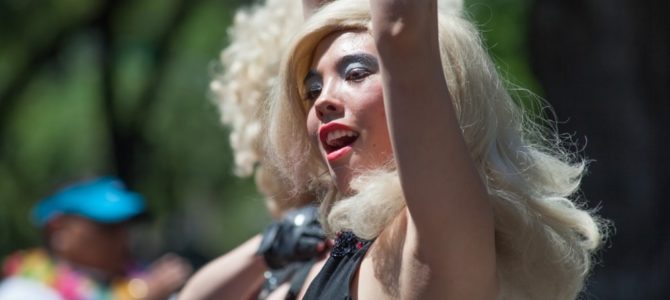
The abolition of man and woman has gone mainstream. Writing in The New York Times, that arbiter of left-wing respectability, Farhad Manjoo argues that “language should not default to the gender binary.” Specifically, he wants to eliminate gendered pronouns such as he and she.
This effort to control language is a deliberate erasure of the identities of those who have not embraced the latest trends in gender ideology, and who are happy to identify with our biological sex. It is a form of cultural and ideological imperialism directed against us, insofar as it linguistically erases our lived reality of biological sex as an essential, integral part of the human experience, and therefore of our identities.
Manjoo writes that
If we lived in a just, rational, inclusive universe — one in which we were not all so irredeemably obsessed by the particulars of the parts dangling between our fellow humans’ legs, nor the ridiculous expectations signified by those parts about how we should act and speak and dress and feel — there would be no requirement for you to have to assume my gender just to refer to me in the common tongue.
This dismissive, reductionist description elides the fundamental sexual dimorphism of the human species. We care about the parts between our fellow humans’ legs in part because they are indispensable to continuing the human species. Our genitalia are only one manifestation of the reality that our entire bodies are sexed, down to the chromosomal makeup of each cell’s nucleus.
In defiance of this, the left has been vacillating between the older feminist claim that gender is a social construct severable from sex, and the new claims of transgender ideology that “gender identity” is an intrinsic and immutable characteristic that is also severable from sex. Neither is correct.
Rather, gender comprises the social expressions of the immutable realities of biological sex. It is the cultural instantiation of the realities of our physical being. Because it is human, it is necessarily imperfect and variable across and within cultures. But it is not infinitely malleable, for it is based on the fixed reality of human embodiment as a sexually dimorphic species. This is what Manjoo and his fellow ideologues really object to—that reality imposes constraints upon us, beginning with our physicality.
Thus, his essay is not a plea for compassion for those who are gender-nonconforming or who suffer from gender dysphoria—and kindness in such cases is indispensable, despite disagreement. Rather, he is in revolt against the givenness of our existence as finite creatures. We are thrown into being, and our existence is bounded by contingencies beyond our control.
That Manjoo’s ire is really aimed at the nature of our being is made clear by his confession of disappointment in his children and their gender expressions.
From their very earliest days, my kids, fed by marketing and entertainment and (surely) their parents’ modeling, seemed to hem themselves into silly gender norms. They gravitated to boy toys and girl toys, boy colors and girl colors, boy TV shows and girl TV shows. This was all so sad to me: I see them limiting their thoughts and their ambitions, their preferences and their identity, their very liberty, only to satisfy some collective abstraction. And there’s little prospect for escape: Gender is a ubiquitous prison for the mind, reinforced everywhere, by everyone, and only rarely questioned.
He finds it “so sad” that his children are apparently happy to follow our culture’s social expressions of the biological reality of the male/female divide. Yet these “silly gender norms” are expressions of the reality of our embodiment as sexually dimorphic primates. His children are not being imprisoned by an abstraction, but developing as the embodied, social beings that we humans are.
His problem is with the universe. He is saddened, not by any suffering of his children, but by their voluntary, natural absorption of cultural norms. It is he who wants to limit them to satisfy an abstraction. He may be imprisoned by the abstractions of ideology, but they are at home in the world.
Gender roles can be stifling when they are too rigid or mistaken in their assumptions. But they are also useful and even comforting. Most of us are comfortable with our biological sex and grow up desiring fulfilling lives as men and women. We want our “gender expression” to be integrated with our biological sex, rather than divided from it, let alone at war with it.
For us, the world of our existence is a home—imperfect, but where we belong and can flourish—rather than the prison that Manjoo posits. He objects not to this or that imperfection of gender norms, but to the very nature of our being.
His perspective was parodied by one of my favorite lines from the philosopher Soren Kierkegaard: “Who am I? How did I come into the world; why was I not asked…Am I not free to decide? Am I to be forced to be part of it? Where is the manager, I would like to make a complaint!” We necessarily are thrown into existence without our consent, and into circumstances we do not choose.
Instead of viewing our being as a gift, Manjoo sees it as a prison sentence. It would be easy to dismiss him as one more silly ideologue whose campaign to control language will likely flounder in the face of human reality. But he represents what has become the dominant ideology of our culture, and it is inflicting real harms, especially on women. For example, female athletes are being supplanted by males who identify as women, and lesbians are being harassed and shamed for not wanting to have sex with lesbian transwomen (i.e., men).
More broadly, because the ultimate objection is to existence itself, this ideology disseminates dissatisfaction and despair that inhibit human flourishing. It is a miserable worldview, and it wants company.









